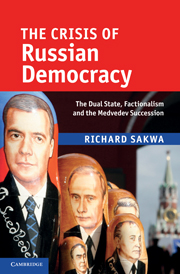Book contents
- Frontmatter
- Contents
- List of tables
- Preface
- Acknowledgements
- Note on transliteration
- 1 The dual state in Russia
- 2 Succession struggles and electoral contests
- 3 Political power and factionalism
- 4 A genuinely political economy
- 5 Managed succession
- 6 War of the Putin succession
- 7 Duma selection
- 8 Presidential succession
- 9 Medvedev's challenge
- 10 Conclusion: transcending the dual state
- Bibliography
- Index
- References
Bibliography
Published online by Cambridge University Press: 05 June 2012
- Frontmatter
- Contents
- List of tables
- Preface
- Acknowledgements
- Note on transliteration
- 1 The dual state in Russia
- 2 Succession struggles and electoral contests
- 3 Political power and factionalism
- 4 A genuinely political economy
- 5 Managed succession
- 6 War of the Putin succession
- 7 Duma selection
- 8 Presidential succession
- 9 Medvedev's challenge
- 10 Conclusion: transcending the dual state
- Bibliography
- Index
- References
- Type
- Chapter
- Information
- The Crisis of Russian DemocracyThe Dual State, Factionalism and the Medvedev Succession, pp. 366 - 384Publisher: Cambridge University PressPrint publication year: 2010



